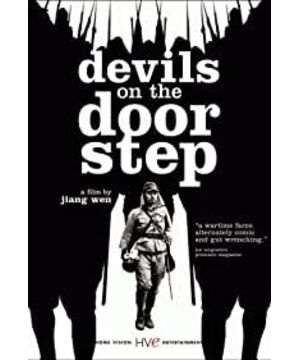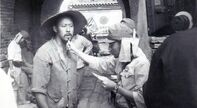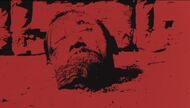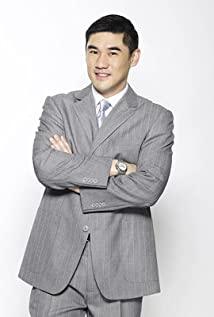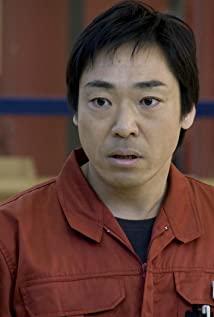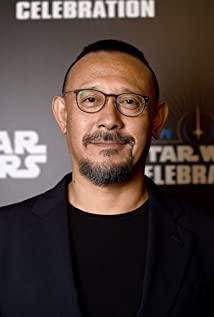It seems to be far away. The fourth character is the common people. I personally think that among the four, they are the most symbolized and neglected group of people in the past history. Their appearance is often to serve the protagonist, and they can really describe them. There are very few works of mentality. In war, fear and greed for death are the true colors of life. I think the biggest contribution of this film is to make the common people become the real protagonists, they are all different and different. The village where Jiang Wen plays this character speaks Tangshan dialect in Hebei, which makes me feel extra cordial. Throughout the movie, you can see the real rural life at that time. Everyone was afraid of death, cowardly, short-sighted, greedy for petty profits, and self-centered. At the same time, being kind, facing the "evil" Japanese devils, he couldn't bear to kill them. In addition, they believe that "people's hearts grow from flesh", and they feel that if they are good to others, others will repay them. Loyalty is a recognized virtue. These are the characteristics of typical Chinese people, and they also apply based on reality. Looking at their conversations, such as the quarrel when they scolded Jiang Wen for not really killing the Japanese, the two-necked, fucking stingy, fearful conversations, and other people's passionate words in order to clear themselves, really, I will go to my hometown now, can find the same people. They are oppressed in reality, no matter the war or the pressure of reality and life. In fact, they don’t ask much. This is a true portrayal of ordinary people. They eat enough, wear warm clothes, get married, support children, watch TV, go shopping, gossip, this is life. , they can also live a good life, even during the Anti-Japanese War, once they are calm, they will still obey their nature and live as usual. Chinese people are famous for their patience. People don't offend me, and I don't offend others. It's better to have less than one thing is the highest criterion in life. However, they still have a bottom line, which may be of general significance. The deception of their own kindness and the killing of their relatives may be the minimum standard to bear. I think Jiang Wen's role, when he rushed to the Japanese prisoner of war camp with an axe, was pure in his mind, just to avenge the blind date and punish the Japanese who deceived him. This has nothing to do with the war. When the Kuomintang officers announced the death sentence, and at the same time, the Japanese who had been kind to him did not feel fear or regret, he saw his bloody head fall to the ground, his eyes opened and closed, and the corners of his mouth were upturned in a smile. is only satisfied.
Regarding the Japanese who play the second role in this film, I personally think it is quite vivid. We have seen in many videos that the Japanese invaders in China thought "fighting for the emperor", and they thought of the curse on Sun Monkey's head. Whenever they had this belief in their hearts, they seemed to be invincible and fierce. However, this constraint is not persistent. Looking at Tsuchiya, the roar of being imprisoned in the early days, the persistence of suicide and martyrdom, as if death is the greatest honor and respect for him, but after a long time, people will still restore their nature, the hardships on the beacon tower, and the former executioner. After escaping death, he was finally awakened. He was just a poor and happy farmer in Japan, and survival became his only desire. There are also Japanese officers who patrol with the military band every day. At the end of the war that lasted for 8 years, the stalemate with the surname of the Chinese boss made him seem to forget that it was a war. Let the second neck send 2 buckets of clean water. However, in the "Military-Civilian Gathering" later in the film, when he knew that Tsuchiya had been imprisoned for half a year in his area of responsibility, the humiliation turned him from a human into a ghost, including the Japanese soldiers who finally participated in the killing. From the peacefulness to the sudden ferocity during the party, it is very strange, "fight for the emperor", and the unique self-esteem of the Japanese, like clockwork, so that they can suddenly lose their nature and become war machines. In Lu Chuan's interview with Nanjing Nanjing, he said that once the war is like a machine, once it is activated, the individuals involved have only two choices, escape or participation, ignoring their own nature and cognition, and perhaps the only way to support their progress method.
The role of the Kuomintang appears at the back of the film, and there are not many scenes. Wu Dawei speaks non-standard Mandarin. In fact, it is very strange why he didn't find someone more like him to play. I think this may be Jiang Wen's intention. This can highlight the sense of distance between the officers who are the rulers of the country and the common people, and make it public in reality. After the traitor was sentenced to death, Jiang Wen, who killed the Japanese in revenge, beheaded Jiang Wen. I think this is the violation of the people's freedom and right to subsistence when the rulers implement their so-called rational policies. Today, there is the same problem. A reasonable law and policy must protect the interests of the majority, and at the same time, it must also ensure that the voices and rights of the minority can be freely expressed.
There is a kind of regret in the whole film, or the true expression is that the main characters, whether Japanese or ordinary Chinese, have no chance or conscious expression to pursue their own happiness and rights. For the emperor above the Japanese, sacrifice is the greatest honor; for the Chinese people, food and safety are the only pursuits. In today's China, our country consciously or not (I believe the former is mostly) avoid cultivating the next generation to pursue the rights of democracy and freedom, and how to fight for and express, mediocrity is more safe and comfortable than personality. In China's future, the biggest crisis is the lack of belief and the self-imprisonment of human nature. When the economic development declines, contradictions will appear on their own.
View more about Devils on the Doorstep reviews


